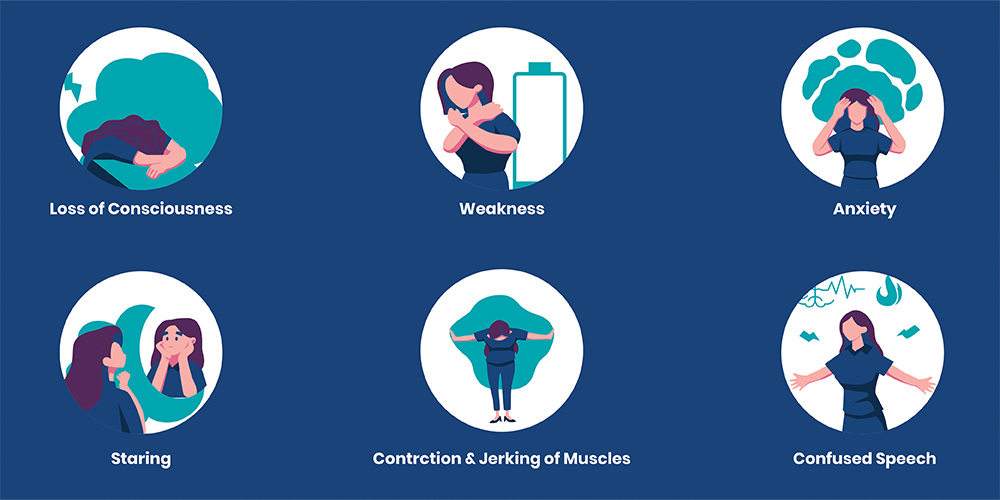Last Updated on May 29, 2024
What is Focal Epilepsy?
To understand what focal epilepsy is, it is crucial to know what epilepsy is. Epilepsy stands as a chronic neurological condition, impacting approximately 50 million individuals across the globe. This disorder manifests through recurrent seizures, fleeting moments marked by involuntary movements that may affect specific body parts (partial seizures) or the entire body (generalized seizures). These episodes sometimes coincide with a loss of consciousness and control over bodily functions like bowel or bladder movement.
A focal seizure refers to any type of epileptic seizure concentrated in a specific region of the brain, typically without spreading elsewhere. This contrasts with generalized seizures, where abnormal electrical activity occurs simultaneously across the entire brain.
Focal seizures stand as the predominant seizure type, affecting around 60% of individuals with epilepsy. Nevertheless, the term “focal seizure” encompasses a diverse range of symptoms. For instance, one person’s focal seizure might entail conscious sensations of anxiety, while another individual may experience loss of consciousness.
Diving into Diversity: Exploring Types of Focal Epilepsy
There are several types of this condition based on the occurrence of seizures, and the specific areas of the brain involved. Here are some common types:
- Focal-Aware Seizures: Focal-aware seizures manifest as epileptic episodes where the individual maintains consciousness and remains aware of their surroundings throughout the seizure event. Typically, these seizures endure for less than a minute.
- Focal-Impaired Awareness Seizures: Focal-impaired awareness seizure entails a loss of consciousness, although the individual may exhibit behaviors that suggest wakefulness. These seizures typically last one to two minutes.
- Secondary Generalized Seizures: Secondary generalized seizures occur when seizure activity initiates in a localized region of the brain, but then spreads to involve the entire brain, leading to a generalized seizure presentation.
Also Read: Abdominal Epilepsy: A Guide to Understanding This Rare Condition
Focal Epilepsy Symptoms: Know What to Look for and Take Control

Focal-onset epilepsy, which is also called partial epilepsy, can show up in diverse ways depending on where in the brain the seizure starts. Here is a rundown of focal epilepsy symptoms:
Focal-Aware Seizures
- Strange sensations like tingling, weird smells or tastes, funky visual changes, or hearing things that are not there
- Jerky movements
- Repetitive actions
- Sometimes, one could suddenly feel intense emotions like fear or have trouble remembering things for a bit
Focal-Impaired Awareness Seizures (Previously Complex Partial Seizures)
- A vacant expression or appearance of lost in thought, as if lost in a daydream
- Repeating actions or just staring off into space
- Lip smacking or chewing repeatedly
Secondary Generalized Seizures
- Losing consciousness
- Convulsing, muscles getting stiff
- Sometimes accidents are like wetting oneself
Known Risk Factors: Causes of Focal Epilepsy
Focal epilepsy, like any health condition, can have different triggers and factors behind it. Here is a look at some of the common causes:
- Structural Issues in the Brain: Sometimes, there can be physical problems in the brain, like tumors, scars from past injuries, or even irregularities present from birth. These can make someone more likely to experience focal epilepsy.
- Genetics: Some types of this disorder can run in families. If certain genes are passed down, it can raise the chances of having seizures.
- Brain Disorders: Neurological conditions that affect how the brain works, such as stroke, multiple sclerosis, or diseases like Alzheimer’s can disrupt normal brain activity and lead to epilepsy.
- Infections: Certain infections, like meningitis or encephalitis, can mess with the functioning of the brain and make epilepsy more likely.
- Developmental Issues: Sometimes, problems with brain development early in life can lead to epilepsy later. This could be due to genetic factors, exposure to harmful substances during pregnancy, or other unknown reasons.
- Blood Vessel Problems: Issues with the blood vessels in the brain, such as malformations or blood clots, can cause disruptions in blood flow and trigger epilepsy.
- Head Injuries: Traumatic events like accidents or falls can cause damage to the brain tissue, increasing the risk of epilepsy, including focal seizures.
- Metabolic Disorders: Certain conditions that affect how the body processes nutrients and energy, like mitochondrial diseases, can also affect brain function and make seizures more likely.
Is Focal Epilepsy Curable? | Explore Treatment & Prevention Strategies
Is focal epilepsy curable? Managing this condition often involves a mix of treatments and prevention strategies for an individual’s needs. Here are some ways doctors approach it:
| Medications | Individuals with focal epileptic disorder take medicines called antiepileptic drugs (AEDs) to help control seizures. There are lots of options out there, and the right one depends on factors like the type of seizures and how well the medicine works for each person. |
|---|---|
| Lifestyle Changes | Sometimes, simple tweaks to daily habits can make a significant difference. Things like getting enough sleep, managing stress, avoiding triggers like alcohol, or flashing lights, and sticking to a routine can help reduce the chances of having seizures. |
| Surgery | For some people whose seizures do not respond well to medication, surgery might be an option. Surgeons can remove the part of the brain where the seizures start, or they might use techniques like placing electrodes in the brain to pinpoint the problem area. |
| Vagus Nerve Stimulation (VNS) | This is a kind of therapy where a device is implanted under the skin in the chest, and it sends regular electrical impulses to the vagus nerve in the neck. It can help reduce seizure frequency and severity for some people. |
| Dietary Therapy | Certain diets, like the ketogenic diet, have been shown to help people with epilepsy, including focal seizures. These diets are high in fat and low in carbohydrates and can sometimes help reduce seizure activity. |
| Epilepsy Clinical Trial | Revive Research Institute is conducting epilepsy clinical research studies in Rochester Hills, Michigan investigating novel treatments that may be able to help you and countless others manage symptoms of epilepsy. |
Takeaway
Living with epilepsy presents unique challenges, but understanding the condition, focal epilepsy symptoms, and available treatment options can empower individuals to take control of their health and well-being. Is focal epilepsy curable? While this condition may not be curable in the traditional sense, it can often be effectively managed with a combination of medications, lifestyle modifications, potential treatments such as clinical treatments and surgical interventions.
By working closely with healthcare providers to find the right treatment approach for their needs, individuals with this disorder can minimize seizure frequency and severity, improve their quality of life, and reduce the impact of epilepsy on their daily activities.
Individuals with focal epilepsy need to stay informed, advocate for themselves, and seek support from healthcare professionals, family, and community resources. With proper management and support, individuals with epilepsy can lead fulfilling lives and achieve their goals while effectively managing their condition.




